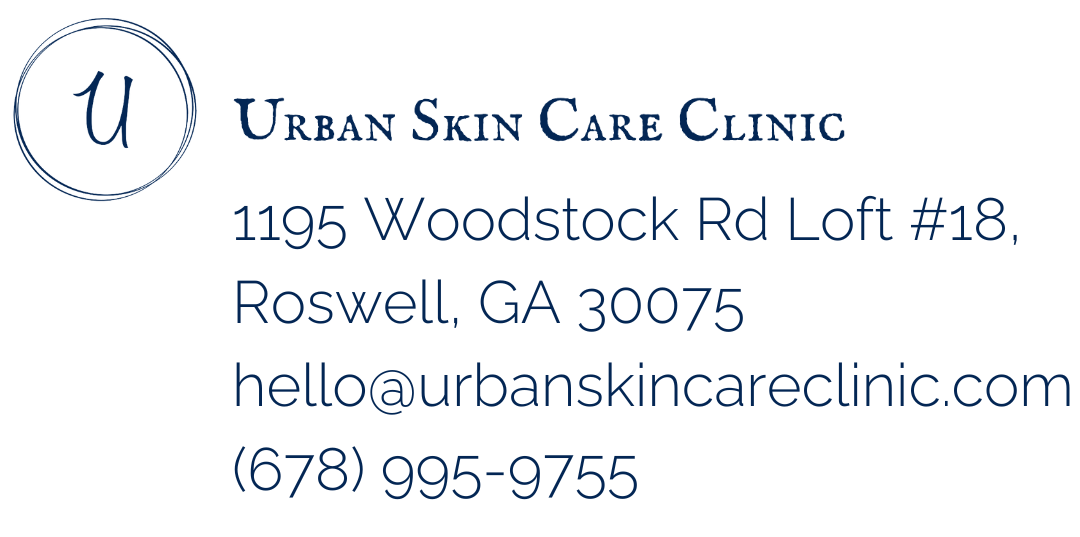Skincare ingredients: what you need to know
Today, we're going over some common skincare ingredients that you see and hear about but may not know their benefits.
Hyaluronic Acid
Hyaluronic acid is a binding agent. What does that mean? This ingredient holds 1000 times its weight in water. Talk about hydration! Now the way it does that is hyaluronic acid attracts moisture into your skin from the environment... but there is a catch: you need to seal this ingredient on your skin with a layer of moisturizer. If you leave it alone on the skin, it will draw the moisture out of your skin and you'll end up feeling drier. That defeats the purpose so always apply moisturizer over your hyaluronic acid.
Vitamin C
Vitamin C is a powerful antioxidant that neutralizes free radical damage that we're exposed to throughout the day. Free radical damage happens on a daily basis through our skin being exposed to smoke, UV rays, pollution... Vitamin C neutralizes that damage and it brightens the skin while evening out the complexion. Vitamin C is a must-have ingredient in pretty much everyone's skincare routine.
Retinoids
There are many different forms of retinoids; retinol, Retin A, tretinoin. These are all derivatives of vitamin A. How does vitamin A benefit the skin? It reduces and prevents wrinkles, and brightens dull skin complexion by exfoliating it at a similar level. It also helps with collagen regeneration. Not an ingredient recommended during pregnancy.
Glycolic Acid
Glycolic acid is a form of a AHA (alpha hydroxy acid) which visibly reduces the appearance of fine lines and wrinkles, in addition to it exfoliating the skin.
Lactic Acid
Lactic acid is also a form of AHA (alpha hydroxy acid). In addition to it exfoliating the skin, Lactic acid is very brightening and also increases the skin's ability to retain moisture.
Mandelic Acid
Mandelic acid is another form of AHA that has anti-inflammatory, anti bacterial, and antifungal properties. Mandelic Acid also improves pigmentation in the skin and is also an exfoliant.
Niacinamide
Niacinamide is a form of antioxidants that helps with moisture retention and improves the appearance of skin tone and texture.
Salicylic Acid
Salicylic acid is a form of BHA (beta hydroxy acid) that dissolves the excess oil in the skin. It contains anti-inflammatory and anti-septic properties. Salicylic acid is also an exfoliant, great for acne prone skin types. And not recommended while pregnant.
Benzoyl Peroxide
Benzoyl Peroxide reduces the p. acne bacteria by deriving oxygen into the pores. This ingredient also unclogs pores and keeps them from clogging which is a key ingredient in treating acne. But there's a specific way of using benzoyl peroxide. If you go all-in and use a high percentage, your skin is probably going to freak out. Slow and steady is the way to go with benzoyl peroxide.
Benzoyl peroxide will bleach fabric so you want to use a white pillowcase, white sheets, a white t-shirt, and wash your hands after applying it.
Peptides
What are peptides? Peptides offer a toning and tightening effect to the skin. Peptides are the building blocks of proteins and stimulate your skin to make more collagen. Great for someone interested in decreasing fine lines and wrinkles and increasing firmness.
Ingredients to avoid
All right, now let's go over some pore clogging oils that are maybe hiding in your skincare products. You want to avoid these oils, especially if they are in your serums and moisturizers. You may get away with it these oils in your cleansers, but I would finish up the cleanser and not replenish. That is because you wash off a cleanser but you want to avoid having these oils in your serums and moisturizers.
Cocoa butter,
coconut butter,
cottonseed oil,
mink oil,
soybean oil,
wheat germ oil,
shea butter,
hydrogenated vegetable oil,
jojoba oil
and sulfated castor oil.
All right. I know you might be wondering, all of these ingredients sound great but which ones do I need? This is exactly why you want to have an esthetician create a skincare routine customized to your skin's unique needs and condition.
Was this article helpful? Please share it with a friend who would benefit from the information.


